Aaron Copland Piano Variations with Sheet music
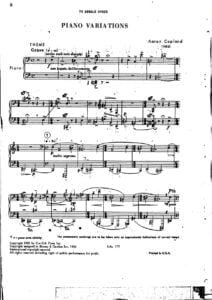
Aaron Copland: American composer
Aaron Copland, (born Nov. 14, 1900, Brooklyn, N.Y., U.S.—died Dec. 2, 1990, North Tarrytown [now Sleepy Hollow], N.Y.), American composer who achieved a distinctive musical characterization of American themes in an expressive modern style.
Copland, the son of Russian-Jewish immigrants, was born in New York City and attended public schools there. An older sister taught him to play the piano, and by the time he was 15 he had decided to become a composer. As a first step Copland tried to learn harmony through a correspondence course. Haltingly and in an environment not particularly conducive to art, he struggled toward his goal.
In the summer of 1921 Copland attended the newly founded school for Americans at Fontainebleau, where he came under the influence of Nadia Boulanger, a brilliant teacher who shaped the outlook of an entire generation of American musicians. He decided to stay on in Paris, where he became Boulanger’s first American student in composition. After three years in Paris, Copland returned to New York City with an important commission: Nadia Boulanger had asked him to write an organ concerto for her American appearances.
Copland composed the piece while working as the pianist of a hotel trio at a summer resort in Pennsylvania. That season the Symphony for Organ and Orchestra had its premiere in Carnegie Hall with the New York Symphony under the direction of the composer and conductor Walter Damrosch.
In his growth as a composer Copland mirrored the important trends of his time. After his return from Paris, he worked with jazz rhythms in Music for the Theater (1925) and the Piano Concerto (1926). There followed a period during which he was strongly influenced by Igor Stravinsky’s Neoclassicism, turning toward an abstract style he described as “more spare in sonority, more lean in texture.” This outlook prevailed in the Piano Variations (1930), Short Symphony (1933), and Statements for Orchestra (1933–35). After this last work, there occurred a change of direction that was to usher in the most productive phase of Copland’s career.
He well summed up the new orientation: “During these years I began to feel an increasing dissatisfaction with the relations of the music-loving public and the living composer. It seemed to me that we composers were in danger of working in a vacuum.”
Furthermore, he realized that a new public for modern music was being created by the new media of radio, phonograph, and film scores: “It made no sense to ignore them and to continue writing as if they did not exist. I felt that it was worth the effort to see if I couldn’t say what I had to say in the simplest possible terms.” Copland therefore was led to what became a most significant development after the 1930s: the attempt to simplify the new music in order that it would have meaning for a large public.
The decade that followed saw the production of the scores that spread Copland’s fame throughout the world. Most important of these were the three ballets based on American folk material: Billy the Kid (1938), Rodeo (1942), and Appalachian Spring (1944; commissioned by dancer Martha Graham).
To this group belong also El salón México (1936), an orchestral piece based on Mexican melodies and rhythms; two works for high-school students—the “play opera” The Second Hurricane (1937) and An Outdoor Overture (1938); and a series of film scores, of which the best known are Of Mice and Men (1939), Our Town (1940), The Red Pony (1948), and The Heiress (1948). Typical too of the Copland style are two major works that were written in time of war—Lincoln Portrait (1942), for speaker and chorus, on a text drawn from Lincoln’s speeches, and Letter from Home (1944), as well as the melodious Third Symphony (1946).
In his later years Copland refined his treatment of Americana: “I no longer feel the need of seeking out conscious Americanism. Because we live here and work here, we can be certain that when our music is mature it will also be American in quality.” His later works include an opera, The Tender Land (1954); Twelve Poems of Emily Dickinson (1950), for voice and piano; and the delightful Nonet (1960).
During these years Copland also produced a number of works in which he showed himself increasingly receptive to the serial techniques of the so-called 12-tone school of composer Arnold Schoenberg. Notable among such works are the stark and dissonant Piano Fantasy (1957); Connotations (1962), which was commissioned for the opening of Lincoln Center for the Performing Arts in New York City; and Inscape (1967). The 12-tone works were not generally well-received; after 1970 Copland virtually stopped composing, though he continued to lecture and to conduct through the mid-1980s.
For the better part of four decades, as composer (of operas, ballets, orchestral music, band music, chamber music, choral music, and film scores), teacher, writer of books and articles on music, organizer of musical events, and a much sought after conductor, Copland expressed “the deepest reactions of the American consciousness to the American scene.”
He received more than 30 honorary degrees and many additional awards. His books include What to Listen for in Music (1939), Music and Imagination (1952), Copland on Music (1960), and The New Music, 1900–60 (1968). With the aid of Vivian Perlis, he wrote a two-volume autobiography (Copland: 1900 Through 1942 [1984] and Copland: Since 1943 [1989]).
Copland’s sheet music is available for download from our Library.
Browse in the Library:
| Artist or Composer / Score name | Cover | List of Contents |
|---|---|---|
| All Sondheim Vol IV Music and lyrics |
 |
All Sondheim Vol IV Music and lyrics |
| All That Jazz piano-vocal Arrangement |
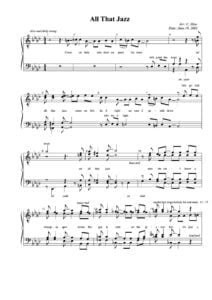 |
|
| All The Things You Are (Guitar And Tabs) | All The Things You Are (Guitar And Tabs) | |
| All The Things You Are (Guitar And Tabs) (Musescore File).mscz | ||
| All The Things You Are By Jerome Kern Guitar Transcription |
 |
|
| All The Things You Are Jerome Kern Oscar Hammerstein 2nd 1940 Jazz Standard (Vintage sheet music) |
 |
|
| All Time Standards (Songbook) Jazz Guitar Tablature Chord Melody Solos (Jeff Arnold) |
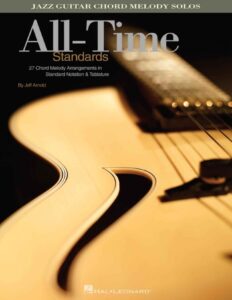 |
All Time Standards (Songbook) Jazz Guitar Tablature Chord Melody Solos (Jeff Arnold) |
| All Time Standards Piano (Arr. Gabriel Bock) |
 |
All Time Standards Piano (Arr. Gabriel Bock) |
| All You Need Is Ears George Martin with Jeremy Hornsby 1979 (Book) The story o the recording genius who created The Beatles |
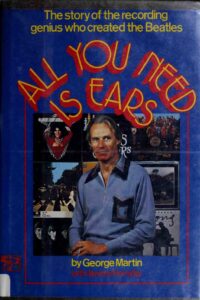 |
|
| Allan Holdsworth Just for the curious book Guitar with Tablature |
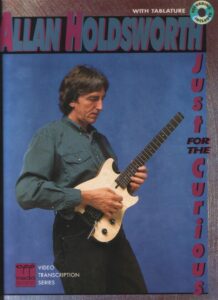 |
|
| Allan Holdsworth Melody Chords For Guitar |
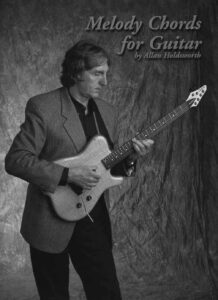 |
|
| Allan Holdsworth Super Guitarist with TABs |
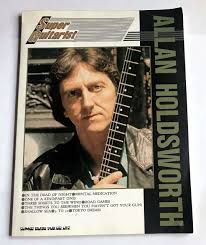 |
Allan Holdsworth Super Guitarist with TABs |
| Alle prese con una verde Milonga (Paolo Conte) | ||
| Allevi, Giovanni – Back To Life |
 |
|
| Allie Wrubel – Gone with the Wind |
 |
|
| Allman Brothers Guitar Songbook |
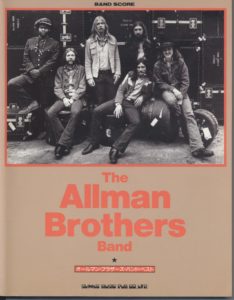 |
Allman Brothers Guitar Songbook |
| Allman Brothers, Best Of The (Piano, Vocal, Guitar) |
 |
Allman Brothers, Best Of The (Piano, Vocal, Guitar) |
| Allman Brothers, The – The Definitive Collection For Guitar Vol 1 with Tablature |
 |
Allman Brothers, The – The Definitive Collection For Guitar Vol 1 |
| Alma Redemptoris Mater |
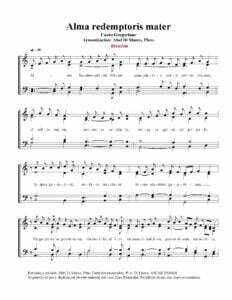 |
|
| Almeno tu nell’universo (Mia Martini) | ||
| Almir Chediak Ivan Lins Guitar Songbook Vol 2 |
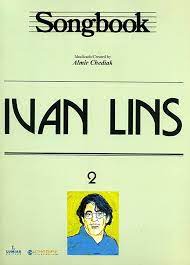 |
Ivan Lins Guitar Songbook Vol 1 by Almir Chediak |
| Alok – Hear Me Now Sheet Music |
 |
|
| Alone together (Howard Dietz & Arthur Schwartz) | Alone together (Howard Dietz Arthur SchwArtz) | |
| Alone Together (Musescore File).mscz | ||
| Alone Togheter Guitar Solo Transcription Jazz Standard |
 |
|
| Alphaville Forever Young (piano & Guitar) |
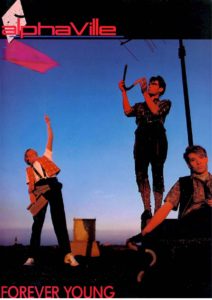 |
Alphaville Forever Young (piano & Guitar) |
| Also Sprach Zarathustra Op. 30 – Richard Strauss (Musescore File).mscz | ||
| Alternative Rock Sheet Music Collection |
 |
Alternative Rock Sheet Music Collection |
| Always on my mind – Elvis Presley – easy arrangement for piano, with fingering |
 |
|
| Amadeus – W.A. Mozart (film score arr. for piano solo by D. Fox) |
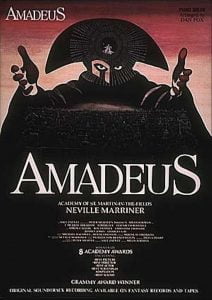 |
Amadeus – W.A.Mozart |
| Amadeus (original soundtrack piano solo arrangements) |
 |
Amadeus (Film score book) Piano Solos |
| Amalia Rodriguez FADOS Melodias De Sempre (GUITAR) |
 |
Amalia Rodriguez FADOS Melodias De Sempre (GUITAR) |
| Amando amando (Renato Zero) | ||
| Amar Pelos Dois (Salvador Sobral) | ||
| Amarcord (Nino Rota) | ||
| Amazing Grace – Tradicional (Piano ) |
 |
|
| Amazing Grace Traditional (Jazzy ver. sheet music) |
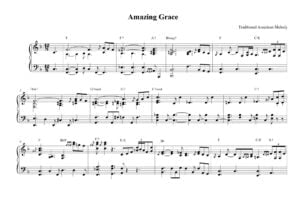 |
|
| Amazing Phrasing – Guitar 50 Ways to Improve Your Improvisational Skills (Guitar TABs Amazing Phrasing) (Tom Kolb) |
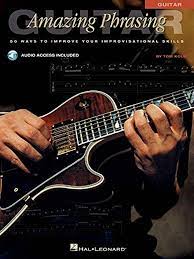 |
Amazing Phrasing – Guitar 50 Ways to Improve Your Improvisational Skills (Guitar TABs Amazing Phrasing) (Tom Kolb) |
| Amelie Poulain – 6 pieces for piano – Yann Tiersen – Yann Tiersen |
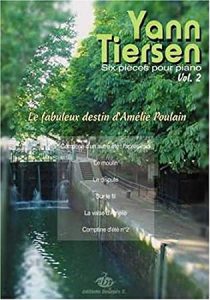 |
 |
| America (My Country ‘Tis of Thee Easy Piano Level 2 |
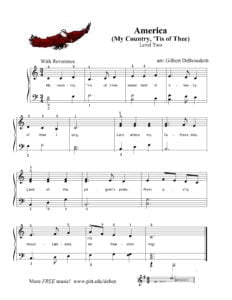 |
|
| America Greatest Hits Piano Vocal Guitar chords |
 |
America Greatest Hits Piano Vocal Guitar chords |
| America Greatest Hits (piano & Guitar) |
 |
America greatest |
| America Horse With No Name Piano vocal | America Horse With No Name Piano vocal | |
| America’s Songs The Stories Behind The Songs Of Broadway, Hollywood, And Tin Pan Alley (Philip Furia, Michael Lasser) Book |
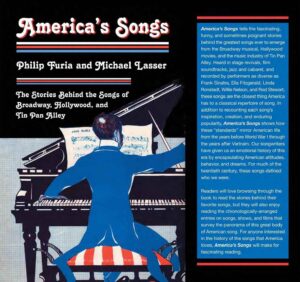 |
|
| American Folk Songs For Guitar with Tablature |
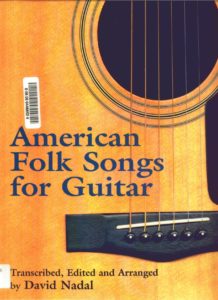 |
American Folk songs |
| American Folk Songs, My First Book of – Bergerac |
 |
|
| American Indian Melodies A. Farwell Op.11 (1901) |
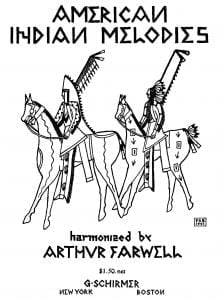 |
American Indian Melodies A. Farwell Op.11-min |
| American Pie (sheet music) |
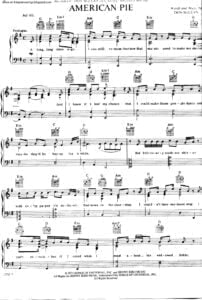 |
|
| American Popular Music (Book) by Larry Starr and Christopher Waterman |
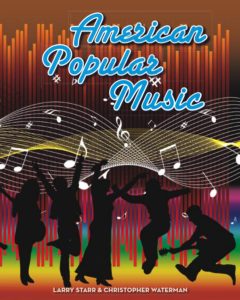 |
|
| Americana – Alegre, Magín (Guitarra) | Americana – Alegre, Magín (Guitarra) | |
| Amici Miei (Carlo Rustichelli) | ||
| Amor mio (Battisti) | ||
| Amore bello (Claudio Baglioni) | ||
| Amy Beach – Op.15 Four Sketches in Autumn |
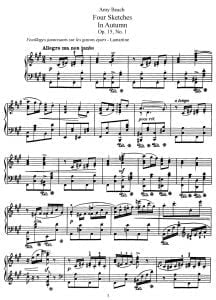 |
|
| Amy Grant – Breath Of Heaven | ||
| Amy MacDonald This Is The Life |
 |
AMY MACDONLAD |
| Amy Winehouse – Valerie |
 |
|
| Amy Winehouse – Valerie (sheet music) |
 |
|
| Amy Winehouse Amy Amy Amy |
 |
|
| Amy Winehouse Back To Black Songbook |
 |
Amy Winehouse Back To Black Songbook |
| Amy Winehouse Frank Songbook |
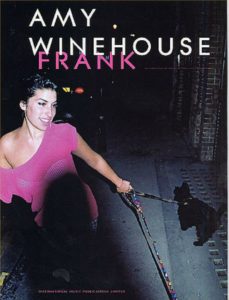 |
Amy Winehouse Frank |
| Amy Winehouse I Heard Love Is Blind |
 |
|
| Amy Winehouse Just Friends |
 |
|
| Amy Winehouse Rehab |
 |
|
| Amy Winehouse You Know Im No Good |
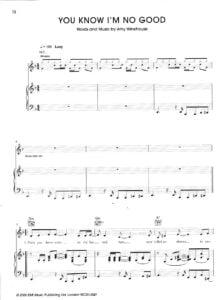 |
|
| An affair to remember (Harry Warren) | ||
| An American In Paris An George Gershwin (Concert Band)An American In Paris An George Gershwin (Concert Band) Arr. by Naohiro Iwai |
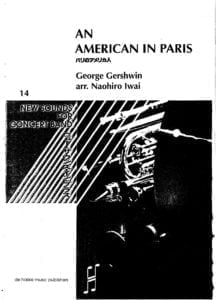 |
|
| An American Tail – The Marketplace – James Horner | ||
| An Introduction To Bach Studies (eBook) |
 |
|
| An Irish Blessing (Musescore File).mscz | ||
| An Irish Blessing (SATB) Choral | An Irish Blessing (SATB) | |
| Analisis musical claves para entender e interpretar la Música (M. y A. Lorenzo) Español |
 |
|
| Analysis Of Tonal Music An Schenkerian Approach Allen Cadwallader and David Gagné (Book) |
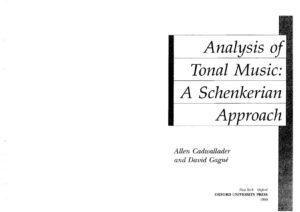 |
|
| Analyzing Bach Cantatas by Eric Chafe (eBook) |
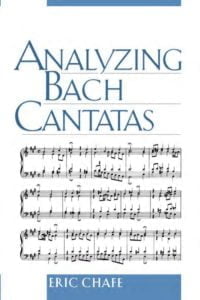 |
|
| Analyzing Schubert by Suzannah Clark (Cambridge Un. Press) (eBook) |
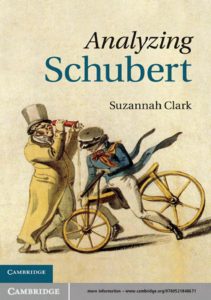 |
|
| Anastacia Not That Kind Songbook |
 |
Anastacia songbook |
| Anastasia Once Upon A December arr. by John Brimhall (Piano Solo 2 Versions Easy And Intermediate) |
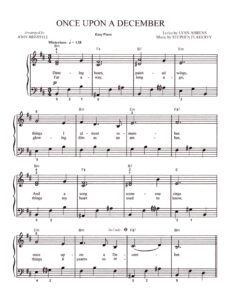 |
|
| Anastasia Sheet Music songbook Piano & vocal |
 |
Anastasia Sheet Music songbook Piano & vocal |
| Ancora ancora ancora (Mina) | ||
| Ancora qui (Django Unchained) Elisa – Ennio Morricone | ||
| And the Waltz goes on (Anthony Hopkins) | ||
| Andante (from String Quartet op. 22) P. I. Tchaikovsky | ||
| Anderson Freire – So Voce Piano |
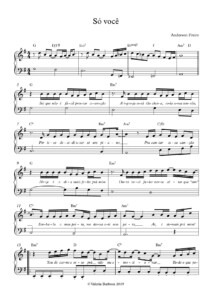 |
|
| Andras Schiff – Music Comes Out Of Silence Book |
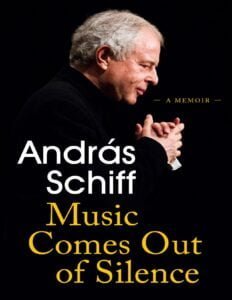 |
|
| Andre Gagnon – L’air Du Soir |
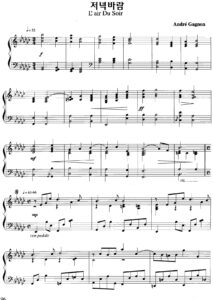 |
|
| Andre Gagnon – Le Reve De L’automne (sheet music Collection) |
 |
Andre Gagnon – Le Reve De L’automne (sheet music Collection) |
| Andre Gagnon – Les Jours Tranquilles | Andre Gagnon – Les Jours Tranquilles | |
| Andre Gagnon – Meguriai |
 |
|
| Andre Gagnon – Nelligan |
 |
|
| Andre Gagnon – Petite Nostalgie |
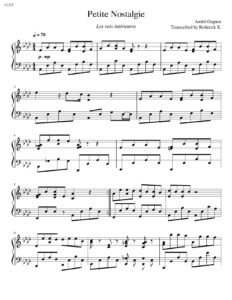 |
|
| Andre Gagnon – Reves D’Automne | Andre Gagnon – Reves D’Automne | |
| Andre Gagnon – The Very Best Of Andre Gagnon (Sheet Music Songbook) |
 |
Andre Gagnon – The Very Best Of Andre Gagnon (Sheet Music Songbook) |
| Andre Gagnon Ciel D’Hiver |
 |
|
| Andre Gagnon Entre Le Boeuf et l’Ane Gris Musique Traditionelle |
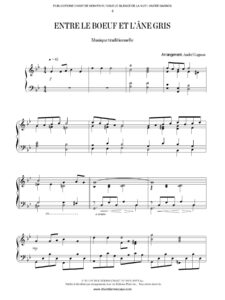 |
|
| André Gagnon L’air Du Soir |
 |
|
| Andre Gagnon Neiges |
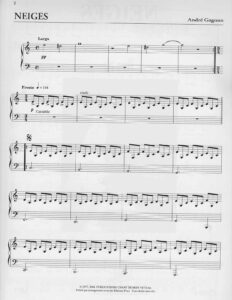 |
|
| André Gagnon Nelligan |
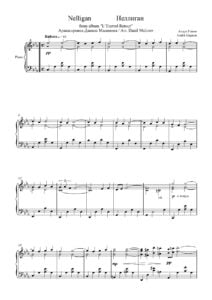 |
|
| André Gagnon Origami |
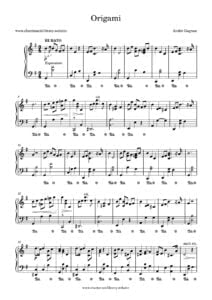 |
|
| André Gagnon Pensées Fugitives |
 |
|
| Andre Gagnon Pensées Fugitives |
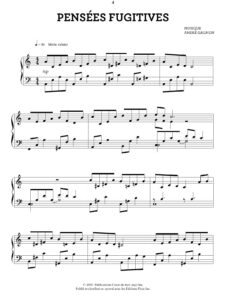 |
|
| André Gagnon Piano Solitude |
 |
Gagnon, André Piano Solitude |
| Andre Gagnon Prologue |
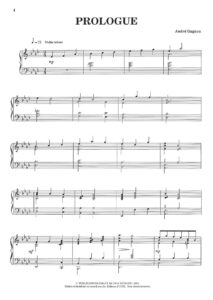 |
|
| André Gagnon Selection Speciale de chansons (partitions musicales) |
 |
André Gagnon Selection Speciale de chansons (partitions musicales) |
| André Gagnon Un Piano Sur La Mer (Piano Solo Partition Sheet Music) | Gagnon André Un Piano Sur La Mer (Piano Solo Partition Sheet Music) | |
| Andre Popp Paul Mauriat Love Is Blue Piano Solo Arr. |
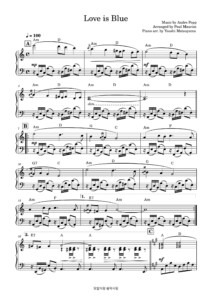 |
|
| André Previn – Play Like André Previn no. 1 |
 |
Andre Previn sheet music |
| Andre Previn – The Genius of (Piano Solos sheet music) |
 |
The genius of André Previn |
| Andre Rieu La Vie Est Belle (Songbook Collection As Performed By André Rieu) |
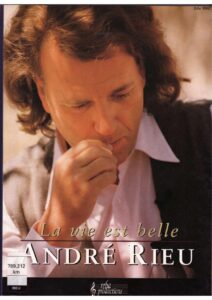 |
Andre Rieu La Vie Est Belle (Songbook Collection As Performed By André Rieu) |
| Andrea Bocceli – Time To Say Goodbye | ||
| Andrea Boccelli – Time To Say Goodbye |
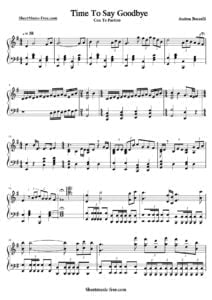 |
|
| Andrea Bocelli Romanza songbook (Guitar & Voice) |
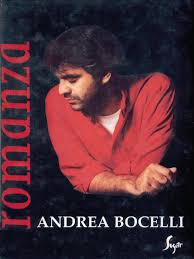 |
Andrea Bocelli Romanza songbook |
| Andrea Bocelli – Anthology (songbook) |
 |
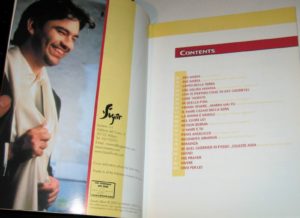 |
| Andrea Bocelli – Con te partiro (Time to say Goodbye) Piano Solo arr | Andrea Bocelli – Con te partiro (Time to say Goodbye) Piano Solo | |
| Andrea Bocelli – Con te partiro (Time to say Goodbye) Piano Solo.mscz | ||
| Andrea Bocelli – The Best Of Songbook |
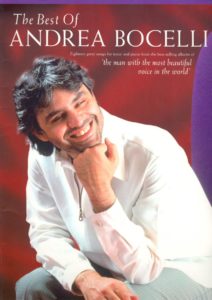 |
Andrea Bocelli best of |
| Andrea Bocelli Celine Dion The Prayer Easy Piano And Vocal By David Foster, Carole Bayer Sager, Alberto Testa And Tony Renis |
 |
|
| Andrea Bocelli Celine Dion – The Prayer – Easy Piano and Vocal by David Foster, Carole Bayer Sager, Alberto Testa and Tony Renis.mscz | ||
| Andrea Bocelli Cieli Di Toscana (Piano, guitar & Vocal) |
 |
Andrea Bocelli Cieli Di Toscana |
| Andrea Bocelli Sogno Songbook |
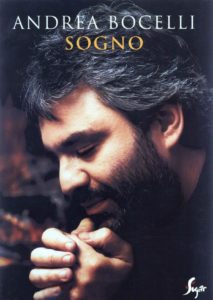 |
Andrea Bocelli sogno |
| Andrea Bocelli The Prayer |
 |
